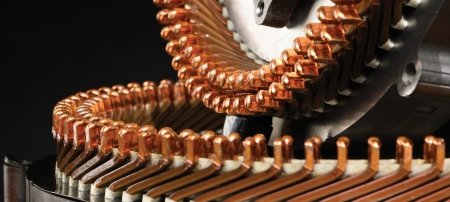Kaleigh Pare’s dad is a Michigan Tech alumnus and an engineer who recruits for Chrysler. But until she came to the Women in Automotive Engineering program at Michigan Tech, all Kaleigh, 17, knew about cars was how to drive one and change the oil—“with my father’s help.”
This week she’s at a Michigan Tech Summer Youth Program called Women in Automotive
Engineering (WIAE), and she’s learning about aerodynamics, suspensions, airbags, hybridization
and pollution, controls and calibration, autonomous vehicles.
And engines. “I had no idea how many components there are in an engine, how complex
they are,” she says.
Kaleigh and her twin sister, Quinn, are both taking WIAE. So is Aleeha Azhar, only her journey to Michigan Tech took a little longer than Kaleigh and Quinn—who live in Memphis, Michigan, near Port Huron. Aleeha, 16, is from Sialkot, a small industrial city in the northeast Punjab region of Pakistan. She is one of four students from the Roots International Schools there who are attending Tech’s Summer Youth Programs this week.
Aleeha doesn’t drive, and she says she knew nothing about cars before this week. Her school offers scholarship program opportunities in the summer, including WIAE.
She says she chose it because “I felt I would be more comfortable with girls.”
Women Can Do Anything
Were Kaleigh and Aleeha surprised to find a class full of girls eagerly exploring the possibilities of automotive engineering? “Women can do anything,” Kaleigh replies decisively. “I’m not so sure women can do anything,” Aleeha chimes in. “There are places in Pakistan where women are still treated as inferior. But that is changing. My city is very progressive. And my parents are very supportive.”
Programs like WIAE are critical to encouraging more young women to consider automotive engineering as a career path,” says Cynthia Hodges, a Michigan Tech alumna and chassis manager at Ford Motor Company. “As an automotive engineer, I get to work on something that makes a difference every day to almost all people in the world. There's no better way to make the world a better place than to work on cars and trucks.”
GM Exec Predicts Bright Future
Gary Smyth agrees. The executive director of global research and development for General Motors, Smyth was visiting Michigan Tech’s Advanced Power Systems Research Center (APSRC) this week and took the opportunity to share some of his insights with the girls.
“This is a great time to be a woman in this industry,” he told them. “The auto industry is coming back in Michigan. This is a great university; these are great courses. The auto industry needs people with a broad range of skills: computer science, mechanical engineering, electrical engineering, software engineering. The connected and autonomous vehicles industry alone is going to be hiring many thousands of people in Michigan.”
Smyth, whose daughter, Sarah, is taking a small business and entrepreneurship Summer Youth Program at Michigan Tech this week, says the summer programs give high school students an idea of the culture of the university. “What’s really important is showing girls the opportunities in STEM (science, technology, engineering and mathematics) and the breadth of options in the automotive industry. They’re learning about the impact they can have on the environment and society.”
The WIAE students are learning about modern automotive technology in Michigan Tech’s Mobile Laboratory at the APSRC, a state-of- the-art engineering teaching laboratory with the sophisticated technology used in the automotive industry today. This is the second year of the program. Last year, it had auto industry sponsors, though this year it did not.
Lead teacher is Chris Morgan, and when Morgan talks automotive engineering, he knows what he’s talking about. He spent seven years in the auto industry, including working as a product development engineer at General Motors. He also worked as a calibration engineer, a software development engineer, a validation engineer and a diagnostic strategist.
Infotainment Engineering
One day this week, he explored “infotainment” with his class. An auto industry term for the technology on the car’s dashboard – from the radio and CD player to touch screens that display information from oil pressure and speed to fuel range and the volume of music being played – infotainment is the software-based interface between the driver and the vehicle.
After the girls learned about various types of infotainment systems, they went on a “scavenger hunt,” looking for the controls that changed the radio from AM to FM, the read-outs that told the driver about tire pressure, oil life expectancy, fuel range and other vital information. They hunted for their checklist of items in a Prius, a Chevy Volt, a Ford Fusion and a natural gas-powered pickup truck.
“We can’t find the tire pressure thingy in the Prius,” one team of girls complained. “That’s good,” said Shane Severn, a fifth-year mechanical engineering student at Tech who was helping teach the class. “Because there isn’t one.”
Morgan, who taught WIAE last year too, said the girls keep surprising him. “I’m amazed and impressed at how sharp they are, how they are able to stay interested and engaged even if cars aren’t really their thing,” he explains.
Michigan Technological University is an R1 public research university founded in 1885 in Houghton, and is home to nearly 7,500 students from more than 60 countries around the world. Consistently ranked among the best universities in the country for return on investment, Michigan's flagship technological university offers more than 185 undergraduate and graduate degree programs in science and technology, engineering, computing, forestry, business, health professions, humanities, mathematics, social sciences, and the arts. The rural campus is situated just miles from Lake Superior in Michigan's Upper Peninsula, offering year-round opportunities for outdoor adventure.







Comments